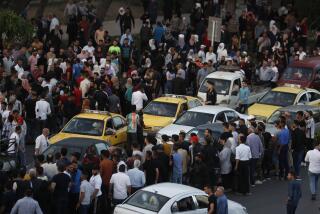U.N. official urges access to besieged Syria civilians
BEIRUT — The United Nations’ top humanitarian official urged both sides in the Syrian civil war on Saturday to allow aid workers access to thousands of civilians trapped in one of several besieged suburbs ringing the capital, Damascus.
Valerie Amos, the U.N.’s chief for humanitarian and relief issues, called for an “immediate pause in hostilities” to allow access for medical and other rescue personnel into Moadhamiya, a mostly rebel-held town southwest of the capital, Damascus. Government troops have laid siege to the rebel stronghold for months.
Last weekend, more than 3,000 civilians, mostly women and children, were able to leave Moadhamiya in a deal brokered between government and opposition representatives. The evacuees from Moadhamiya were provided with food, medical aid, temporary housing and psychological support, humanitarian agencies said.
But the U.N. official said Saturday that “the same number or more remain trapped” in the community, which has been the frequent target of shelling and clashes.
Opposition activists have complained of a lack of food, medical attention and other necessities in Moadhamiya and other besieged areas near Damascus and elsewhere in Syria, where the civil war is in its third year. Much of the country is a hodgepodge of government-held and rebel-controlled areas. Both sides throw up armed checkpoints to mark where their territory begins and ends.
The Syrian military is pressing assaults against numerous areas where rebels are active, including several suburbs of Damascus and contested districts in and around the central city of Homs. Insurgents ensconced in rubble-strewn, heavily bombarded areas have mounted a stubborn defense against government attacks and bombardments.
Each side in the conflict blames the other for the plight of thousands of civilians trapped in war zones.
The government says opposition forces are holding civilians hostage in a bid to dissuade massive bombardments. The opposition says government forces open fire on those who try to leave and arrest many who do manage to escape.
“It is vital that all parties to the conflict respect their obligations under international human rights and humanitarian laws to protect civilians and to allow neutral, impartial humanitarian organizations safe access to all people in need, wherever they are in Syria,” Amos, the U.N. humanitarian chief, said in a statement.
Meanwhile, continued battles and bombardments were reported Saturday throughout Syria, including in the suburbs of the capital.
A car bomb driven by a suicide attacker exploded at the entrance to the government-held Jaramana district outside Damascus, injuring 15 people, most of them listed in critical condition, the official Syrian news service said. At least 15 rebels and 16 government forces were killed in fighting that followed the explosion, according to the British-based Syrian Observatory for Human Rights, a pro-opposition monitoring group. An Al Qaeda-linked rebel group, Jabhat al Nusra, undertook the car bombing, the observatory said.
Jaramana, with a large population of Christians and Druze minorities, is a loyalist bastion frequently targeted by rebel mortars and car bombs. The town is strategically situated at the southeast approach to the capital, adjacent to several rebel-held areas. But the mostly Sunni Muslim rebel fighters have been unable to make advances into heavily defended Jaramana, where Army troops and local militiamen loyal to the government provide tight security.
ALSO:
Norwegian friends, family describe Kenya mall attack suspect
Saudi Arabia rejects Security Council seat, lashes U.N. as failure
Mexico’s lower house of Congress approves new taxes on junk food
More to Read
Sign up for Essential California
The most important California stories and recommendations in your inbox every morning.
You may occasionally receive promotional content from the Los Angeles Times.










